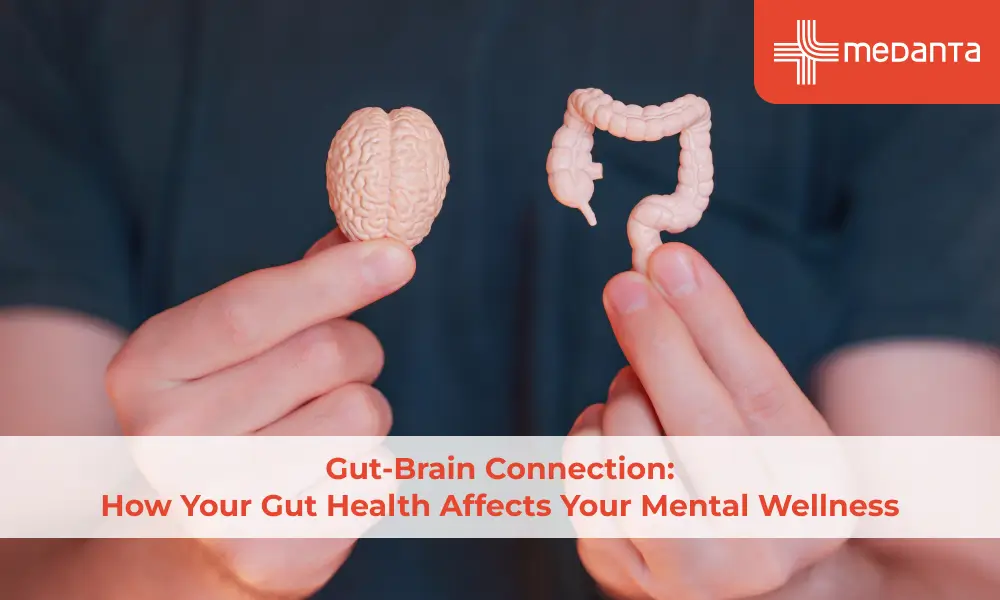Gut-Brain Connection: How Your Gut Health Affects Your Mental Wellness

TABLE OF CONTENTS
Do you know that a powerful link exists between your digestive health and mental well-being through the gut-brain connection? This connection also lays a foundation for our overall well-being. Our body produces 90% of its serotonin, a key mood stabiliser, in the gut. This remarkable fact shows why scientists now see the gut-mental health relationship in a new light.
The brain and gut exchange more information than any other body system. Their ongoing dialogue shapes our hunger, food cravings, mood, behaviour, and stress levels. Many people experience functional bowel problems at some point in their lifetime, which can lead to mental health challenges. According to research, good gut health supports mental well-being, whereas digestive problems can affect mental health negatively. Research shows that psychological treatments often give better results for digestive symptoms than standard medical care alone.
The relationship between your gut health & mental wellness works both ways, creating an intriguing connection. The next sections will explain how gut bacteria shape mental health, what creates a healthy gut environment, and practical steps to enhance both digestive and mental well-being through this crucial link.
Understanding the Gut-brain Axis
The unique connection between your digestive system and mental health exists through what researchers call the "gut-brain axis". This works as a remarkable two-way communication highway that links your digestive tract with your central nervous system. This two-way pathway enables constant information exchange and influences your physical and mental well-being.
Your digestive system contains what scientists call the enteric nervous system (ENS)—a complex network of 200 to 600 million neurons. The system's sophistication leads experts to call it the "second brain". The ENS can work on its own and manage digestive functions even without central nervous system control.
Your body's two "brains" communicate through several advanced pathways:
Neural connections: The vagus nerve acts as the main information superhighway that sends signals between your gut and brain.
Chemical messengers: Your gut bacteria create neurotransmitters like serotonin, GABA and dopamine—the same chemicals that control your mood and emotions. Your gut produces 90% of the body's serotonin.
Immune signalling: Your gut microbes also shape your immune system. They can trigger inflammation that affects your digestive and brain health.
Hormonal pathways: The hypothalamic-pituitary-adrenal (HPA) axis ties up stress responses to gut function.
New studies show that gut microbes do more than aid digestion—they shape brain development, cognitive function, and emotional regulation.
This biological link explains daily experiences—how stomach discomfort can affect your mood. The connection between your gut activity and brain function is real and physical, not just psychological.
How Gut Health Affects Your Mental Wellness

The communication between your gut microbiome and brain happens through several fascinating mechanisms. Scientists have discovered that changes in gut bacteria can trigger anxiety, depression, and stress responses through various biological pathways.
Your intestinal bacteria create neurotransmitters - the same chemicals that control your emotions. Your gut produces more than 90% of serotonin, the "feel-good" hormone. Your gut bacteria also create GABA, dopamine, and acetylcholine - crucial elements that regulate your mood.
This relationship centres around inflammation. A compromised gut allows bacterial toxins to enter your bloodstream and triggers immune responses that cause inflammation. These inflammatory signals travel to your brain and can trigger depression and anxiety symptoms. Your body interprets gut inflammation as a stress signal.
This stress connection works both ways. Your brain's fight-or-flight response kicks in during anxiety or stress, which disrupts digestion and changes how your gut moves. These digestive issues can create a never-ending cycle between gut problems and emotional distress.
Certain gut bacteria play key roles in mental health:
Low amounts of Bifidobacterium and Lactobacillus associate with higher anxiety
Low levels of Coprococcus and Dialister bacteria appear in people with depression
Firmicutes and Bacteroidetes disproportions affect mental health conditions
Research shows that people with major depressive disorder have unique gut microbiota patterns than healthy individuals.
The vagus nerve works as a communication superhighway between your gut and brain. Your gut bacteria also produce metabolites like short-chain fatty acids that pass through the blood-brain barrier and affect brain function.
How to Improve the Gut-Brain Connection
Your gut and brain communication can make a big difference in your digestive and mental health. Simple daily habits strengthen this connection:
Nutrition: Proper nutrition serves as the lifeblood of a healthy gut-brain axis. Whole foods support beneficial gut bacteria and help prevent inflammation. Your gut microbiota thrives on fibre from vegetables, fruits, legumes, and whole grains that keep your bowels regular. Each food provides different fibre types, and variety helps maintain a balanced microbiome.
Probiotic-rich foods: Yoghurt, kefir, kimchi, and sauerkraut add beneficial bacteria directly to your digestive system. These fermented foods can change brain activity in positive ways. Prebiotic foods like bananas and legumes nourish your existing gut bacteria and create a thriving internal ecosystem.
Regular exercise: Physical activity brings remarkable benefits to gut health, including:
Speeds up waste movement through your intestines
Builds beneficial bacterial communities that make short-chain fatty acids
Makes your gut barrier stronger and reduces inflammation
Research shows that 30-60 minutes of moderate exercise can boost bacteria like Faecalibacterium. These bacteria play a vital role in your gut health and mental well-being.
Stress management techniques: Your gut function and microbiome change when you experience chronic stress. Meditation, yoga, and deep breathing activate your parasympathetic nervous system and support good digestion. An 8-day meditation practice showed increased levels of beneficial gut bacteria and anti-inflammatory compounds.
Quality sleep: Poor sleep throws off your gut microbiome's natural patterns. You might experience more inflammation, stress hormones, and unhealthy food cravings when you don't get enough rest.
A visit to a gastroenterologist makes sense if digestive problems continue despite lifestyle changes. These specialists can identify gut-brain interaction disorders and suggest the right treatment plan.
Conclusion
Your gut and brain work together as partners to maintain overall wellness. They communicate through complex pathways. Gut bacteria produce neurotransmitters, change inflammation levels, and shape mental health conditions like anxiety and depression.
Without a doubt, a healthy digestive system improves your mental health. Some simple daily habits make the most important difference.
Science shows this connection flows both ways. Mental stress impacts your digestion, while gut issues can change your mood. You get the best results by working on both systems together.
The next time anxiety or low mood hits, think over what your second brain needs. A walk outside, a nutritious meal, or restful sleep could help your gut and mind feel better. These two systems talk to each other constantly—we just need to listen.
Note that each person's body responds in its own way. The general principles work for most people, but finding what suits your gut-brain connection takes time and testing. Your body sends signals about what it needs—listening to these messages builds lasting mental and digestive health.
FAQs
How long does it typically take to improve my gut health?
Improving gut health is a gradual process. While introducing probiotic-rich and high-fibre foods you can see quick positive effects. However, substantial and long-lasting changes often require several months of consistent healthy habits.
What are some effective ways to support a healthy gut-brain connection?
To support a healthy gut-brain connection, focus on eating:
A balanced diet enriched in whole foods and fibre
Probiotic foods like yoghurt and kimchi
Exercise regularly
Manage stress through techniques like meditation
Prioritise quality sleep
Why is maintaining a healthy gut important for overall well-being?
A healthy gut is important for proper digestion, metabolism, and immunity. It also plays a huge role in mental health, as the gut-brain axis allows constant communication between these two systems, influencing mood, behaviour, and stress levels.
How does stress impact my gut-brain connection?
Stress significantly affects your gut-brain connection. Chronic stress can disrupt your gut function, alter the composition of gut bacteria, and trigger inflammation. This, in turn, can lead to digestive issues and potentially impact mental health, creating a cycle between gut distress and emotional distress.






